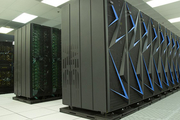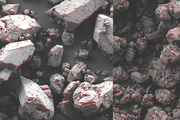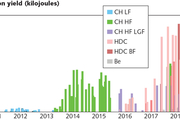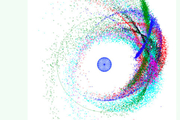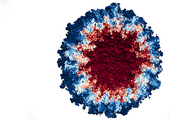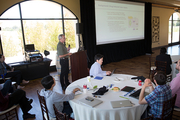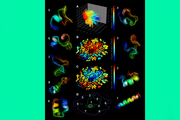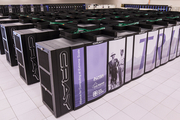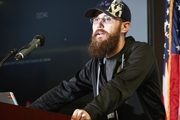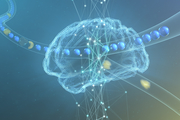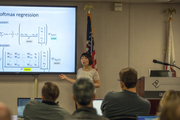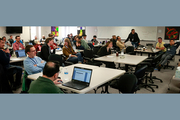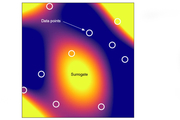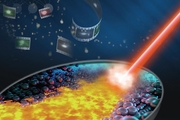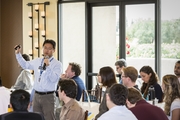Did you know we have a monthly newsletter? View past volumes and subscribe.
New partnership to unleash U.S. supercomputing resources in the fight against COVID-19
March 26, 2020 -
The White House announced the launch of the COVID-19 High Performance Computing Consortium to provide COVID-19 researchers worldwide with access to the world’s most powerful high performance computing resources that can significantly advance the pace of scientific discovery in the fight to stop the virus. Read more at LLNL News.
Machine learning accelerates high-performance materials development
Feb. 13, 2020 -
Lawrence Livermore National Laboratory (LLNL) and its partners rely on timely development and deployment of diverse materials to support a variety of national security missions. However, materials development and deployment can take many years from initial discovery of a new material to deployment at scale. Now, an interdisciplinary team of LLNL researchers from the Physical and Life Sciences...
Deep learning may provide solution for efficient charging, driving of autonomous electric vehicles
Feb. 4, 2020 -
LLNL computer scientists and software engineers have developed a deep learning-based strategy to maximize electric vehicle (EV) ride-sharing services while reducing carbon emissions and the impact to the electrical grid, emphasizing autonomous EVs capable of offering 24-hour service. Read more at LLNL News.
Can machine learning improve computer models enough to ignite internal confinement fusion?
Jan. 28, 2020 -
Laser-fusion researchers have turned to machine-learning techniques to seek the combinations of laser pulse characteristics and target design needed to optimize target implosions for inertial confinement fusion. Machine learning has tripled the fusion yield of the simpler direct-drive approach being studied with the OMEGA laser at the University of Rochester. In principle, the Rochester...
Department of Energy researchers share data management strategies at first-ever “Data Day”
Nov. 11, 2019 -
It’s become something of a mantra of the digital age: Data is the new currency. Especially in science, where it’s hard to find a single project that doesn’t involve generating or consuming massive amounts of data.
In light of the growing awareness of the critical importance of data management across the Department of Energy complex, more than 100 researchers from DOE national laboratories...
Big data illuminates the physical sciences
Nov. 6, 2019 -
Livermore teams are applying innovative data analysis and interpretation techniques to advance fundamental science research. This article describes projects in astrophysics and materials science. Read more at Science & Technology Review.
Successful simulation and visualization coupling proves the power of Sierra
Oct. 22, 2019 -
As the first National Nuclear Security Administration (NNSA) production supercomputer backed by GPU- (graphics processing unit) accelerated architecture, Sierra’s acquisition required a fundamental shift in how scientists at Lawrence Livermore National Laboratory (LLNL) program their codes to take advantage of the GPUs.
The majority of Sierra’s computational power—95 percent of its 125...
Collaboration drives data science workshop
Sept. 12, 2019 -
Lawrence Livermore National Laboratory’s (LLNL’s) Data Science Institute (DSI) hosted its second annual workshop on July 23–24, 2019. Co-sponsored by the University of California (UC) system, the event drew more than 200 participants to Garré Winery in Livermore. A common theme ran throughout both days: Collaboration is always welcome.
Indeed, feedback from last year’s workshop inspired a...
CANDLE illuminates new pathways in fight against cancer
Aug. 16, 2019 -
As part of the Department of Energy’s role in the fight against cancer, scientists are building tools that use supercomputers to solve problems in entirely new ways. Cancer research provides a complex deep learning challenge that enables DOE to develop new supercomputing capabilities that will, in turn, help scientists address challenges in national security and science. The CANcer...
Hyperion Research announces new winners of HPC Innovation Excellence Awards
June 18, 2019 -
Hyperion Research announced the 14th round of recipients of the HPC Innovation Excellence Award at the ISC19 supercomputer industry conference in Frankfurt, Germany. Led by Brian Spears, an LLNL team used the Trinity supercomputer to seek out successful modes of laser-driven fusion implosions by building an enormous database for supervised training of a machine learned surrogate...
Speech generation: siblings collaborate on machine learning hackathon project
May 28, 2019 -
The first recording that brothers Sam and Joe Eklund, along with their colleague Travis Chambers, played for the audience was a validation.
“I endorse Travis as president of the United States of America,” the audio clip played, in a voice resembling Barack Obama’s.
The second, in the same voice, was a declaration: “Ice is back, our brand new invention” (from the song “Ice Ice Baby” by...
Researchers explore machine learning to automate sorting of microcapsules in real-time
April 16, 2019 -
Micro-Encapsulated CO2 Sorbents (MECS) — tiny, reusable capsules full of a sodium carbonate solution that can absorb carbon dioxide from the air — are a promising technology for capturing carbon from the atmosphere. To create the caviar-like objects, scientists run three fluids through a series of microfluidic components to create drops that turn into capsules when exposed to ultraviolet...
International collective of scientists seeks refined understanding of climate system
March 25, 2019 -
LLNL climate scientists announced the release of new data sets that will provide fresh insights into past and future climate change. Some of these data sets come from model simulations performed at LLNL, one of the more than 40 climate research centers and consortia engaged in next-generation climate change simulations. These results have been produced as part of an international effort to...
ESGF conference caps a productive year
Feb. 12, 2019 -
Members of the Earth System Grid Federation (ESGF) gathered in Washington, DC, on December 3–7 for the 8th annual conference. The event packed 40 presentations, several plenary sessions, a poster session, guest speakers, an awards ceremony, and an executive committee meeting into the week. The Lawrence Livermore National Laboratory (LLNL) delegation comprised 19 staff from the Computation and...
Going deep: Lab employees get an introduction to world of machine learning, neural networks
Feb. 1, 2019 -
Deep learning is one of the most popular and widely used machine learning methods due to its success with autonomous vehicles, speech recognition and image classification, to name a few emergent technologies. But what exactly is deep learning, and how can it best be applied to Lab projects? LLNL employees discovered the answers during a recent "Deep Learning 101" course, which introduced the...
Dispatches from the fall hackathon
Dec. 18, 2018 -
This recap of LLNL's seasonal hackathon was provided by the web team that manages several LLNL websites. Mike Goldman, director of the Data Science Institute (DSI), stopped by the team's table during the hackathon to discuss the Open Data Initiative. Read more at LLNL Computing.
Playing video games may help researchers find personalized medical treatment for sepsis
Dec. 18, 2018 -
A deep learning approach originally designed to teach computers how to play video games better than humans could aid in developing personalized medical treatment for sepsis, a disease that causes about 300,000 deaths per year and for which there is no known cure. LLNL, in collaboration with researchers at the University of Vermont, is exploring how deep reinforcement learning can discover...
Machine learning points toward new laser target designs
Oct. 8, 2018 -
When the Trinity supercomputer at Los Alamos National Laboratory was first coming online, calls went out for research projects that would test—and potentially break—the new system. LLNL researchers answered the call, and their work with Trinity and machine learning could disrupt 40 years of assumptions about inertial confinement fusion (ICF). The project essentially turned Trinity—then a 8.1...
LLNL explores machine learning to prevent defects in metal 3D-printed parts in real time
Sept. 13, 2018 -
LLNL researchers have developed machine learning algorithms capable of processing the data obtained during metal 3D printing in real time and detecting within milliseconds whether a 3D part will be of satisfactory quality. Read more at LLNL News.
Data science workshop embraces multidisciplinary community
Aug. 28, 2018 -
Since launching in early 2018, Lawrence Livermore National Laboratory’s (LLNL’s) Data Science Institute (DSI) has hit the ground running with a series of seminars, collaborative sessions, reading groups and other activities for the LLNL data science community. On August 7–8, 2018, the DSI hosted its inaugural offsite workshop, which was co-sponsored by the University of California (UC).
More...

